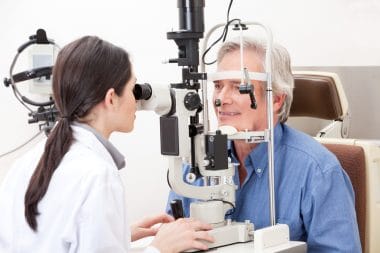Retinal detachment is often referred to as detached retinal or a retinal tear. The retina is the membrane that lies against the back wall of the eye. This light sensitive tissue is responsible for sending images through electrical impulses to the brain.
Retinal detachment is a medical emergency. Time is critical when retinal detachment occurs. The detached retina must be immediately reattached through surgery or there will be loss of vision in the affected eye.
There is no pain with retinal detachment. But you will have warning signs of a detached retina. If you notice the sudden appearance of many spots or what looks like hairs or strings floating in your field of vision, you should seek evaluation by an eye professional.
Other symptoms of retinal detachment are: sudden flashes of light in one or both eyes or if you notice a shadow over part of your field of vision you need to seek immediate evaluation.
The causes of retinal detachment may be trauma, an inflammatory disorder or it can be caused by advanced diabetes. But a lot of times, retinal detachment will occur without any underlying factors present. This can happen because of a change in the jelly-like vitreous that is contained in the vitreous cavity of your eye.
This jelly-like substance will change as you grow older. It will either decrease or liquefy. Either of these conditions can cause the vitreous cavity to sag, which in turn can cause pressure on the surface of the retina, resulting is a tear in the tissue of the retina.
A retinal detachment is more common in people over the age of 40. A detached retina is more common in men than women.
A retinal detachment is more likely to occur in people who are severely nearsighted. If you have a detached retina in one eye already or if you have a family history of retinal detachment, you have a higher risk of developing a detached retina.
A previous eye injury or underlying eye disease or disorders will increase your risk for developing a detached retina. If you have had cataract surgery in the past, you will have an increased risk for retinal detachment.
The treatment for retinal detachment is laser surgery. Small holes or tears in the retina are “welded” back together with a laser. Sometimes more advanced surgery is required to repair a detached retina. This advanced surgery may require a stay in the hospital.
The good news is that with modern treatment, about 90 percent of those people who experience retinal detachment will regain their vision. But the results of the treatment may not be known for several months as the eye goes through the healing process. It is important that you see your doctor or eye care professional right away if you notice any changes in your vision. Prompt intervention can save your eyesight.








Reply